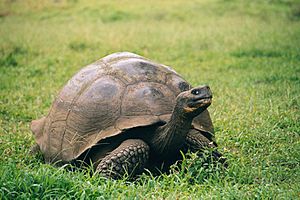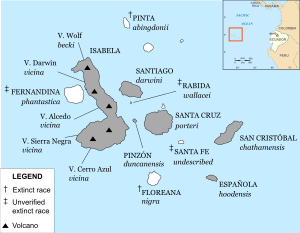Western Santa Cruz tortoise facts for kids
Quick facts for kids Western Santa Cruz tortoise |
|
|---|---|
 |
|
| Conservation status | |
| Scientific classification |
|
| Kingdom: | Animalia |
| Phylum: | Chordata |
| Class: | Reptilia |
| Order: | Testudines |
| Suborder: | Cryptodira |
| Family: | Testudinidae |
| Genus: | Chelonoidis |
| Species: | |
| Subspecies: |
C. n. porteri
|
| Trinomial name | |
| Chelonoidis niger porteri (Rothschild, 1903)
|
|
 |
|
| Synonyms | |
|
|
The western Santa Cruz tortoise (Chelonoidis niger porteri) is a special type of Galápagos tortoise. It lives only on Santa Cruz Island in the Galápagos. This means it is endemic to that island, found nowhere else in the world.
These tortoises live on the southwestern slopes of Santa Cruz Island. Their home covers about 141 square kilometers. Scientists believe there are about 3,400 of these tortoises in the wild. Their numbers are slowly growing, which is good news.
Contents
Meet the Western Santa Cruz Tortoise
These amazing creatures can live for a very long time. Their life expectancy is around 175 years! They are known for their large, domed shells.
What They Look Like
The western Santa Cruz tortoise has a black, oval-shaped shell. This shell is called a carapace. It can grow up to 130 centimeters long. The shell is higher in the middle than at the front. It also looks wide at the front.
Where They Live
These tortoises are found only on Santa Cruz Island. This island is part of the famous Galápagos Islands. They prefer the southwestern parts of the island.
Discovering Different Tortoise Groups
Scientists have studied the DNA of these tortoises. They found that there are actually three different groups of tortoises on Santa Cruz Island. Even though they live on the same island, their DNA shows they are a bit different.
New Discoveries on the Island
In 2015, scientists made an exciting discovery. They found a small group of tortoises on the eastern side of the island. This group was named C. n. donfaustoi. It was found to be a completely new type of tortoise.
Scientists learned that this new group is closely related to other tortoises. These include those from Chatham, Abingdon, and Hood islands. The main western Santa Cruz tortoise population, porteri, is more closely related to tortoises from Floreana and southern Isabela islands. This shows how diverse the Galápagos tortoises are.
See also
 In Spanish: Tortuga gigante de Santa Cruz para niños
In Spanish: Tortuga gigante de Santa Cruz para niños
 | Bessie Coleman |
 | Spann Watson |
 | Jill E. Brown |
 | Sherman W. White |


